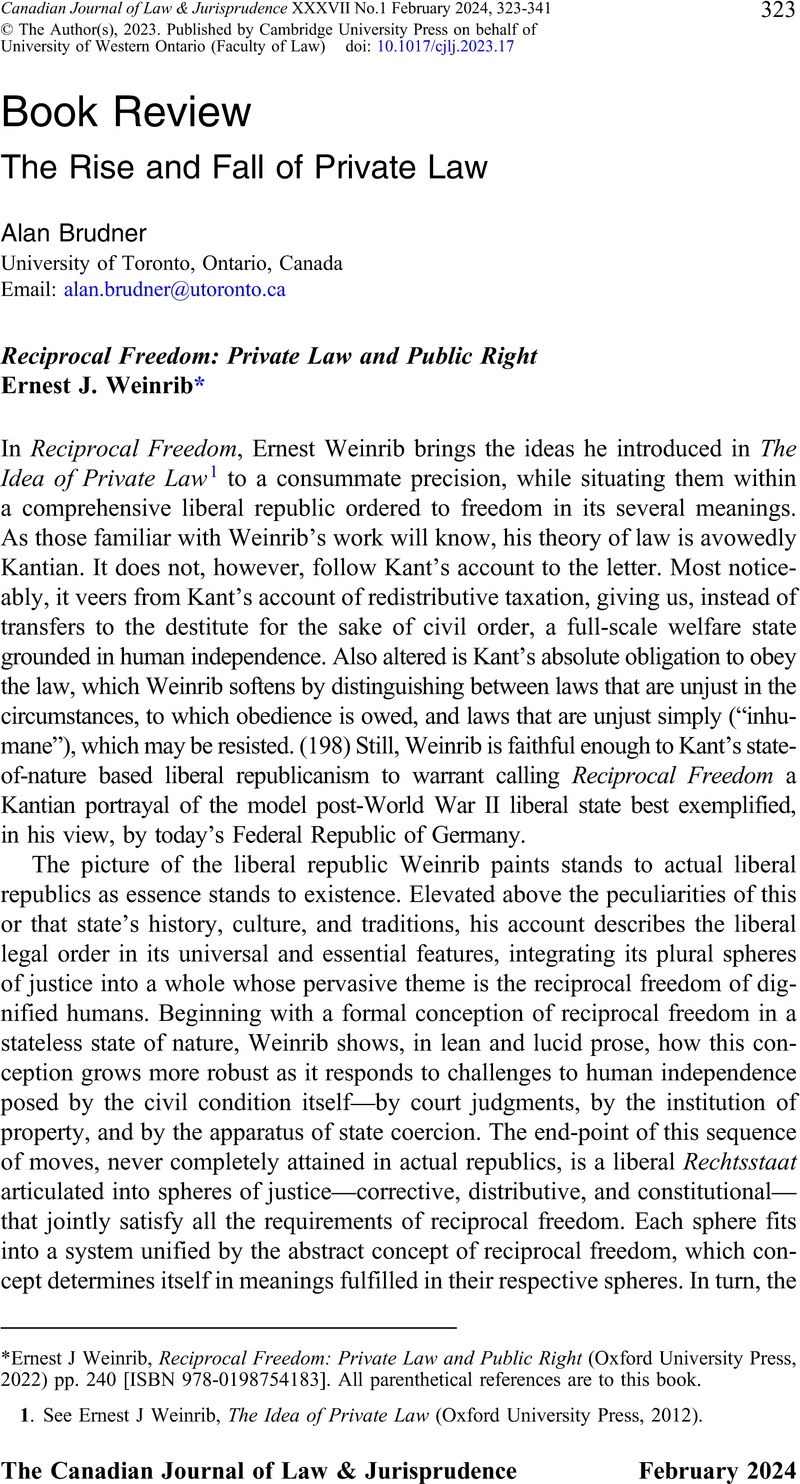No CrossRef data available.
Published online by Cambridge University Press: 18 October 2023

Ernest J Weinrib, Reciprocal Freedom: Private Law and Public Right (Oxford University Press, 2022) pp. 240 [ISBN 978-0198754183]. All parenthetical references are to this book.
1. See Ernest J Weinrib, The Idea of Private Law (Oxford University Press, 2012).
2. GWF Hegel, Phenomenology of Spirit, translated by AV Miller (Oxford University Press, 1977) at 19 (§ 32).
3. Weinrib, supra note 1 at 4.
4. See ibid at 81. This idea is restated in Reciprocal Freedom: “[C]orrective justice is fair as between the parties because, in looking solely to the parties’ legal relationship and thus to their correlative positions, it excludes considerations that are unilaterally applicable … to one or the other of them. Corrective justice thus treats the parties as normative equals.” (21)
5. Ernest J Weinrib, “Professor Brudner’s Crisis” (1990) 11:1 Cardozo L Rev 549 at 550.
6. This shift was foreshadowed in Ernest J Weinrib, “Private Law and Public Right” (2011) 61:2 UTLJ 191.
7. Immanuel Kant, “Metaphysics of Morals” in Immanuel Kant, Practical Philosophy, translated & edited by Mary Gregor (Cambridge University Press, 1996) 353 at 451 (Ak 6:307, § 42).
8. Weinrib addresses this claim, initially put forward in Alan Brudner, “Private Law and Kantian Right” (2011) 61:2 UTLJ 279, in Reciprocal Freedom (72, n 10). Knocking down his points one by one would sound a disagreeably combative tone, but there is one that I cannot let stand. Weinrib writes: “[I]n accordance with his thesis that private right has no residual force under public right, Brudner … asserts that, under Kant’s conception of public right, a person whose property has been expropriated has no right to compensation. Kant, however, is explicit that such a right exists.” The passage to which Weinrib refers (see Kant, supra note 7 at 502 [Ak 6:639]) says that the state owes feudal tenants of church land compensation upon the state’s taking control of the land. For Kant, however, the duty of compensation is a conditional one deriving from public distributive justice, not an unconditional one correlative to private property. It takes hold when the landholder would otherwise shoulder a burden that ought to be spread over the citizenry, but not where the expropriated land was unfairly concentrated in the first place. That is why only the tenants of church property are owed compensation, not the church itself. Granted Kant’s postulate of public Right, there can be no appeal from public distributive justice back to the state of nature, hence no right to compensation based on a private property that limits public distributive justice. The right of feudal tenants to compensation for takings of church property must, on Kant’s principle that all Right proceeds from the people’s united will, be viewed as the correlate of the state’s duty to include the tenants’ interest in secure possession in the public interest. It cannot be a duty to compensate for an infringement of property, for Kant says that “[t]hose affected by [land reform] cannot complain of their property being taken from them.” Kant, supra note 7 at 467 (Ak 6:325).
9. Kant, supra note 7 at 457 (Ak 6:313, § 46) [emphasis in original].
10. See ibid at 446 ff (Ak 6:301-303).
11. Ibid at 444 (Ak 6:297-98).
12. See GWF Hegel, Hegel’s Logic: Being Part One of the Encyclopedia of the Philosophical Sciences (1830), 3rd ed translated by William Wallace (Clarendon Press, 1975) at 115ff (§ 81).
13. Thus, Kant says: “[A] right to a thing is a right to the private use of a thing of which I am in (original or instituted) possession in common with all others.” Kant, supra note 7 at 413 (Ak 6:261) [emphasis in original]. On this view, there is no sharp distinction between yours and mine; there is only ours.
14. “Why then, it may be asked, begin with the false and not at once with the true? To which we answer that truth, to deserve the name, must authenticate its own truth.” Hegel, supra note 12 at 122 (§ 83).
15. “But by Dialectic is meant the indwelling tendency outwards by which the one-sidedness … of the predicates of understanding is seen in its true light, and shown to be the negation of them. For anything to be finite is just to suppress itself and put itself aside. Thus understood the Dialectical principle constitutes the life and soul of scientific progress, the dynamic which alone gives immanent connexion and necessity to the body of science.” Hegel, supra note 12 at 116 (§ 81).
16. The others are the tort of inducing breach of contract and the assignability of contractual rights.
17. Here I assume that Weinrib would not say that ownership is subordinated to the general interest in the maximization of value, for that un-Kantian suggestion would rob ownership of meaning.
18. On a Hegelian understanding of nuisance, the latter differs from trespass in that, whereas a trespass infringes a possessory right that can be established unilaterally, a nuisance infringes a property in use that is mediated by reciprocity. But the concept of a property that is mediated by reciprocity is already present in contract, so that nuisance law applies to use the idea of a right mediated by reciprocity that contract law embodies with respect to acquisition. Accordingly, no public law modification of private Right is needed to understand nuisance law; the latter is as firmly ensconced in private law as contract is.
19. See Constitution Act, 1982, ss 32, 52.
20. [2011] ZACC 13.
21. John Rawls, Political Liberalism (Columbia University Press, 1993).